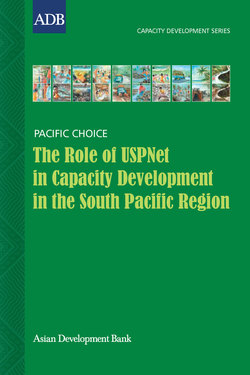Читать книгу The Role of USPNet in Capacity Development in the South Pacific Region - Ronald Duncan - Страница 4
На сайте Литреса книга снята с продажи.
FOREWORD
ОглавлениеDespite 50 years of aid in the Pacific region, including some S$17 billion invested over the past 25 years, overall results in terms of sustainable improvements in capacity have been mixed, at best. This raises questions, not only in the Pacific but also throughout the developing world, about approaches to capacity development—what works, what doesn’t, and why? The Asian Development Bank (ADB) recognizes the importance of capacity development, having officially embraced it as a thematic priority in 2004. ADB’s commitment is consistent with the Paris Declaration on Aid Effectiveness and the Pacific Principles on Aid Effectiveness. The programs of a number of other funding agencies, including the Australian Agency for International Development (AusAID), New Zealand’s Agency for International Development (NZAID), United Nations Development Programme (UNDP), and the World Bank also embrace the importance of more effective capacity development.
Increased interest in capacity development in recent years reflects an acknowledgment of the shortcomings in development assistance over the past 50 years. This has led to calls for approaches that are more systematic and integrated, and which focus more on developing country ownership and achievement of sustainable results. Capacity amounts to the policy, procedures, personnel, organizations, institutions, and supporting environment required to effectively deliver development outcomes. In particular, ADB has focused on the ability of public sector capacity to deliver essential services, thereby strengthening the compact between government, civil society, and the private sector. Capacity development is much more than just training or skills transfer. It is really about effective organizations and institutions, a sound unpoliticized policy environment, accountability systems, effective relationships, and appropriate incentives. And as noted in this study, capacity development should be firmly rooted in a country’s political economy.
To gain a better understanding of what works in terms of approaches to capacity development, ADB’s Pacific Department (PARD) commissioned a regional study in 2007. The study was rooted in 20 case studies from 11 countries across the region, prepared mainly by Pacific islands consultants. The case studies covered a range of programming experiences—from economic planning, to infrastructure development, health and legal sector reform, and civil society enhancement, as well as different modalities for supporting capacity development. ADB’s intent in commissioning the overall study was to draw upon the individual findings and recommendations to help guide future capacity building efforts in the Pacific, including institutionalizing a more focused and effective approach to capacity development in ADB’s country programs and operations.
The case studies in this series and the overall study report are the result of collaboration among a number of consultants working with ADB under the direction of Steve Pollard, Principal Economist, PARD. The team leader for the overall study was Joe Bolger, and the authors of the studies were Helio Augusto, Kevin Balm, Brian Bell, Ron Duncan, Ben Graham, Ueantabo Mackenzie, James McMaster, Samson Rihuoha, Cedric Saldanha, Tom Seta, Paulina Siop, Esekia Solofa, Kaveinga Tu’itahi, Henry Vira, and Vaine Wickman. The study also benefited from the input of a number of resource persons, including Tony Hughes (Solomon Islands), Lynn Pieper (Timor-Leste), Tim O’Meara (Samoa), and Patricia Lyon, Senior Capacity Development Specialist, AusAID. The case studies represent the situation at the time of writing in 2007.
In conclusion, this report seeks to enhance understanding and dialogue on capacity development and its potential for contributing to poverty reduction and improvements in the quality of life of all Pacific islanders. I trust that you will find it both thought-provoking and practically helpful in advancing our collective commitment to development in the Pacific.
Philip Erquiaga Director General Pacific Department
